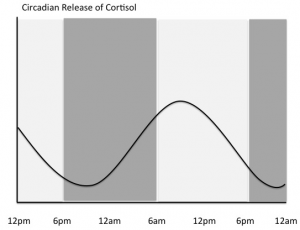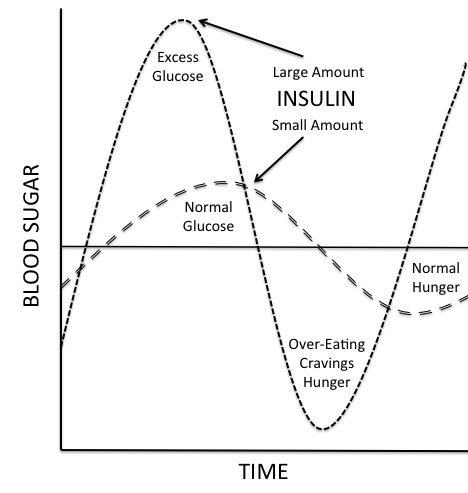Sleep is of utmost importance to your body composition, because it can positively or negatively affect your hormonal profile – with just one hour of missed sleep (than what is optimal for you) prompting your brain to release cortisol, and throwing off your natural circadian flow of “elevated in the morning” and “decreasing throughout the day.
This means future sleep will be more difficult, and all of the negative hormonal changes (that we’ll discuss next) will be exacerbated going forward. Ultimately producing a human being that’s set-up to eat too much of the wrong foods, store it as fat instead of muscle, and burn next to nothing.
A 2008 review in the journal Obesity determined that a shorter than optimal sleep increases obesity risk by 58%!
The main reason we store fat is because excess (or chronically elevated) cortisol decreases leptin – the hormone that controls energy input (hunger) and output (energy burning). Though it’s also because a consistent lack of sleep can cause temporary glucose intolerance (insulin resistance). Meaning, what we do eat is going to result in blood sugar levels that are higher than normal, for longer than normal. And thus create a situation where insulin is chronically elevated, and we’re in a state of consistent storage and inhibited burning.
(Not to mention that whole EXTRA hunger thing too…)
Simply put, it’s a slippery slope when sleep is missed – as we get into a chronic state of over-storage and under-burning, and we wind up craving more and eating more.
Consistently poor sleep can lower leptin 18-20%, and cause ghrelin to elevate by 24-28%.
And if all that wasn’t bad enough, sleep also negatively affects our ability to maintain muscle. With research showing that 1 night of poor sleep results in lower anabolic hormones (testosterone, gH, etc), the following day.
Imagine what 5 nights in a row can do!?
Conversely, getting quality sleep increases muscle building hormones (like testosterone), and actually improves our overall resiliency to stress (cortisol). It also maintains healthy glucose and leptin levels, and elevates our metabolic rate – making us less likely to make poor food choices, over-eat, and store unwanted fat.

Basically, good sleep produces what we do want, and a lack of sleep produces what we don’t want – a high-fat, low-muscle physique, that can’t tolerate glucose, and burns next to nothing. Whether we’re “dieting” or not.
For instance, in a study from the Annals of Internal Medicine where participants were put on the same diet and split into separate sleep groups, both groups lost the same amount of ‘weight,’ but only 48% of it was fat in those instructed to sleep 5.5hrs per night, while 80% of it was fat in those instructed to sleep 8.5hrs.
And that’s before getting into the health consequences!
Sadly, these extend well beyond the impact of hyperglycemia and fat storage. Since the immune system is activated when a lack of sleep is perceived (1, 2), and this results in an inflammatory response (of the chronic kind) that affects our central nervous system, disrupts homeostasis, and increases our risk of disease (1, 2), and mortality (1, 2).
“The cumulative long-term effects of sleep loss and sleep disorders have been associated with a wide range of deleterious health consequences including an increased risk of hypertension, diabetes, obesity, depression, heart attack, and stroke.”

Simply put, EVERY system in your body is affected by the quality and duration of sleep. With research from 2013 in the Proceedings of the National Academy of Sciences, showing that:
1 week of sleep deprivation altered the function of 711 genes, including those involved in stress, inflammation, metabolism, and immunity.
Meaning, the less good sleep you get now, the closer you get to sleeping for good!
Harsh I know, but maybe it will finally get you to start prioritizing it.
Stay Lean!
Coach Mike
RELATED ARTICLES:
The Best Thing You Can Do For Your Brain


